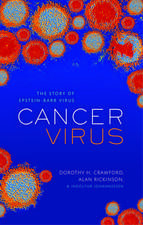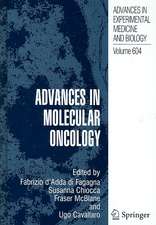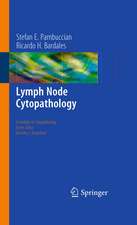Biology and Treatment of Colorectal Cancer Metastasis: Proceedings of the National Large Bowel Cancer Project 1984 Conference on Biology and Treatment of Colorectal Cancer Metastasis Houston, Texas — September 13–15, 1984: Developments in Oncology, cartea 42
Editat de Anthony J. Mastromarinoen Limba Engleză Paperback – oct 2011
Din seria Developments in Oncology
- 5%
 Preț: 360.70 lei
Preț: 360.70 lei - 5%
 Preț: 384.80 lei
Preț: 384.80 lei - 5%
 Preț: 345.71 lei
Preț: 345.71 lei - 5%
 Preț: 1096.98 lei
Preț: 1096.98 lei - 5%
 Preț: 360.86 lei
Preț: 360.86 lei - 5%
 Preț: 1125.88 lei
Preț: 1125.88 lei - 5%
 Preț: 3183.63 lei
Preț: 3183.63 lei - 5%
 Preț: 371.30 lei
Preț: 371.30 lei - 5%
 Preț: 374.57 lei
Preț: 374.57 lei - 5%
 Preț: 1417.91 lei
Preț: 1417.91 lei - 5%
 Preț: 375.34 lei
Preț: 375.34 lei - 5%
 Preț: 368.57 lei
Preț: 368.57 lei - 5%
 Preț: 1102.10 lei
Preț: 1102.10 lei - 5%
 Preț: 368.37 lei
Preț: 368.37 lei - 15%
 Preț: 604.56 lei
Preț: 604.56 lei - 5%
 Preț: 1425.76 lei
Preț: 1425.76 lei - 5%
 Preț: 1119.10 lei
Preț: 1119.10 lei - 5%
 Preț: 374.57 lei
Preț: 374.57 lei - 5%
 Preț: 1416.09 lei
Preț: 1416.09 lei - 5%
 Preț: 723.21 lei
Preț: 723.21 lei - 5%
 Preț: 713.33 lei
Preț: 713.33 lei - 5%
 Preț: 1424.16 lei
Preț: 1424.16 lei - 5%
 Preț: 718.65 lei
Preț: 718.65 lei - 5%
 Preț: 367.64 lei
Preț: 367.64 lei - 5%
 Preț: 1423.22 lei
Preț: 1423.22 lei - 5%
 Preț: 1097.71 lei
Preț: 1097.71 lei - 5%
 Preț: 3836.15 lei
Preț: 3836.15 lei - 5%
 Preț: 1100.64 lei
Preț: 1100.64 lei - 5%
 Preț: 1109.08 lei
Preț: 1109.08 lei - 5%
 Preț: 1419.39 lei
Preț: 1419.39 lei - 5%
 Preț: 1439.31 lei
Preț: 1439.31 lei - 5%
 Preț: 1114.71 lei
Preț: 1114.71 lei
Preț: 372.03 lei
Preț vechi: 391.61 lei
-5% Nou
Puncte Express: 558
Preț estimativ în valută:
71.21€ • 74.06$ • 59.67£
71.21€ • 74.06$ • 59.67£
Carte tipărită la comandă
Livrare economică 13-27 martie
Preluare comenzi: 021 569.72.76
Specificații
ISBN-13: 9781461294177
ISBN-10: 1461294177
Pagini: 356
Ilustrații: 352 p.
Dimensiuni: 155 x 235 x 19 mm
Greutate: 0.5 kg
Ediția:Softcover reprint of the original 1st ed. 1986
Editura: Springer Us
Colecția Springer
Seria Developments in Oncology
Locul publicării:New York, NY, United States
ISBN-10: 1461294177
Pagini: 356
Ilustrații: 352 p.
Dimensiuni: 155 x 235 x 19 mm
Greutate: 0.5 kg
Ediția:Softcover reprint of the original 1st ed. 1986
Editura: Springer Us
Colecția Springer
Seria Developments in Oncology
Locul publicării:New York, NY, United States
Public țintă
ResearchCuprins
I. The Biology of Colorectal Cancer Metastasis.- 1. Natural History of Liver Metastasis and Resective Treatment.- 2. The Use of Nude Mice to Ascertain the Malignant Capacity of Human Colon Cancer.- 3. The Cotton-Top Tamarin as an Animal Model of Colorectal Cancer Metastasis.- 4. Clinicopathologic Studies on Mechanisms of Metastasis in Man and Other Vertebrates.- 5. Metastatic Colorectal Carcinoma: Pathobiologic Subsets.- 6. The Use of Lectins in Biochemical Studies on Colorectal Carcinoma Metastasis.- II. Controversies in the Management of Patients with Colorectal Cancer Metastasis.- 7. Quality of Life: A Cerebral Affair.- 8. Quality of Life and Cost Effectiveness Issues in the Management of Patients with Hepatic Metastases from Colorectal Cancer.- III. The Prevention and Local Treatment of Colorectal Metastasis.- 9. Regional Infusion Chemotherapy for Colorectal Hepatic Metastases.- 10. Local Surgical Treatment of Hepatic Metastases from Colorectal Carcinoma: Survival Times and Sites of Recurrence.- 11. Endoscopic Laser Surgery for Colonic Neoplasia.- 12. Pharmacokinetics of Hepatic Arterial Chemotherapy.- 13. Adjuvant Radiation Therapy for Colorectal Cancer.- 14. Hepatic Resection for Colorectal Carcinoma Metastases: Present Status and Future Prospects.- 15. New Diagnostic Techniques in Hepatic Mass Detection.- 16. Predictive Assays of Clinical Response for Primary and Metastatic Colorectal Cancer.- 17. Radiolabeled Antibodies for Gastrointestinal Malignancies.- IV. Criteria of Response.- 18. Problems with Response Criteria.- 19. Accuracy of Diagnostic Techniques with Follow-Up and Evaluation of Disease Recurrence.- 20. The Evaluation of Serial Marker Measurements for Monitoring Patients at Risk of Recurrent Cancer: Application to Colorectal Cancer.- 21. Prognostic Factors for Liver Metastases from Colorectal Cancer.- V. Analysis of Failure.- 22. Clinical Patterns of Failure After Resection of Colon and Rectum Carcinoma Metastases to the Liver.- 23. Drug Resistance in Colon Cancer.- 24. Biology of Colon Cancer Resistance to Treatment.- 25. Circumvention of Neoplastic Heterogeneity by System- ically Activated Macrophages.









